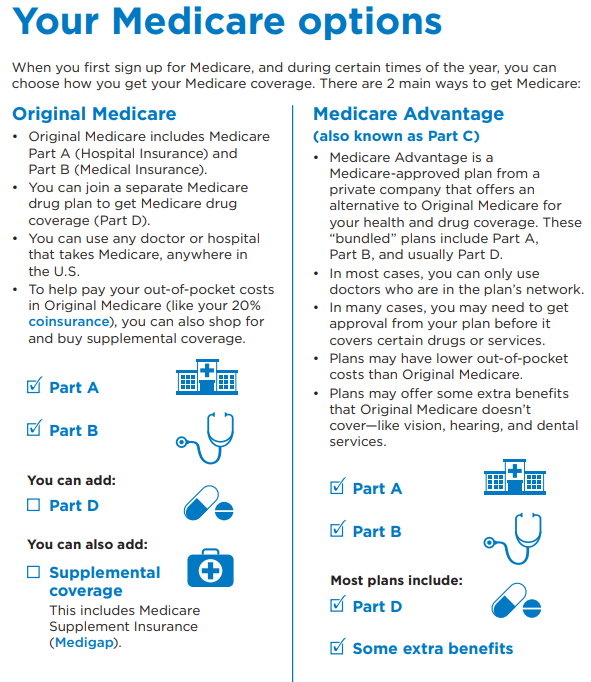- Licensed & Approved Agency in Multiple States
- (888) 901-4870
- (404) 996-0045

Medicare Updates: 2019 Medicare Parts A & B Premiums and Deductibles
November 20, 2018
Turning 65 and Still Working?
September 13, 2019Costly Confusion: Medicare Preventive Wellness Visit Isn’t The Same As An Annual Physical
 Medicare Preventive Wellness
Medicare Preventive Wellness
Preventive visits covered under Medicare aren’t the same as an Annual Physical. So don’t get tripped up by Medicare’s confusing coverage rules. Federal law prohibits the health care program from paying for annual physicals, and patients who get them may be on the hook for the entire amount- even with a Medicare Supplement “Medigap” insurance plan. But beneficiaries pay nothing for an “annual wellness visit,” which the program covers in full as a Medicare preventive service.
“It’s very important that someone, when they call to make an appointment, uses those magic words, ‘Medicare annual wellness visit,’” said Leslie Fried, senior director of the Center for Benefits Access at the National Council on Aging. ” Otherwise, people think they are making an appointment for an annual wellness visit and it ends up they are having a complete physical.”
An annual physical typically involves an exam by a doctor along with blood-work or other tests. The annual wellness visit generally doesn’t include a physical exam, except to check routine measurements such as height, weight and
blood pressure.
The focus of the Medicare preventive annual wellness visit is on preventing disease and disability by coming up with a “personalized prevention plan” for future medical issues based on the beneficiary’s health and risk factors. At their first wellness visit, patients will often fill out a risk-assessment questionnaire and review their family and personal medical history with their doctor, a nurse practitioner or physician assistant. The clinician will typically create a schedule for the next decade of mammograms, colonoscopies and other screenings and evaluate people for cognitive problems and depression as well as their risk of falls and other safety issues.
They may also talk about advance care planning with beneficiaries to make decisions about what type of medical
treatment they want in the future if they can’t make decisions for themselves.
At subsequent Medicare preventive annual wellness visits, the doctor and patient will review these issues and check basic measurements. Beneficiaries can also receive other covered preventive services such as flu shots at those visits without charge.
When the Medicare program was established more than 50 years ago, its purpose was to cover the diagnosis and treatment of illness and injury in older people.
Preventive services were generally not covered, and routine physical checkups were explicitly excluded, along with
routine foot and dental care, eyeglasses and hearing aids.
Over the years, preventive services have gradually been added to the program, and the Affordable Care Act established coverage of the annual wellness visit. Medicare beneficiaries pay nothing as long as their doctor accepts Medicare.
However, if a wellness visit veers beyond the bounds of the specific covered Medicare preventive services into diagnosis or treatment — whether at the urging of the doctor or the patient — Medicare beneficiaries will typically owe a copay or other charges. (This can be an issue when people in private plans get preventive care, too. And it can affect patients of all ages. The ACA requires insurers to provide coverage, without a copay, for a range of preventive
services, including immunizations. But if a visit goes beyond prevention, the patient may encounter charges.)
And to add more confusion, Medicare beneficiaries can opt for a “Welcome to Medicare” preventive visit within the
first year of joining Medicare Part B, which covers physician services. Meanwhile, some Medicare Advantage “Part
C” plans cover annual physicals for their members free of charge. The trade off there is that you will be on the hook for much more than a physical may cost if you’re hospitalized, have an outpatient procedure, etc under a Part C plan… versus having a Medigap plan and just paying for the physical.
“Many patients want their doctor to evaluate or treat chronic conditions like diabetes or arthritis at the wellness
visit”, said Dr. Michael Munger, who chairs the board of the American Academy of Family Physicians. But Medicare
generally won’t cover lab work, such as cholesterol screening, unless it’s tied to a specific medical condition.
At Munger’s practice in Overland Park, Kan., staffers routinely ask patients who come in for a wellness visit to sign an “advance beneficiary notice of non-coverage” acknowledging that they understand Medicare may not pay for some of the services they receive.
As long as beneficiaries understand the coverage rules, it’s not generally a problem, Munger said. “They don’t want to come back for a separate visit, so they just understand that there may be extra charges,” he said. Beneficiaries may not be the only ones who are unclear about what an annual wellness visit involves, said Munger.
Providers may be put off if they think that it’s just another task that adds to their paperwork.
A recent study published in the journal Health Affairs found that in 2015 just over half of practices with eligible
Medicare patients didn’t offer the annual wellness visit. That year, 18.8 percent of eligible beneficiaries received an
annual wellness visit, the analysis found.
Primary care physicians generally want to see their patients at least once a year, Munger said, but it needn’t be for a
complete physical exam.
A wellness visit or even a visit for a sprained ankle could give doctors an opportunity to check in with patients and
make sure they’re on track with preventive and other care, Munger said.
If you have questions on what Medicare plan is right for you, please call me directly at (888) 901-4870. You can also click the link below to schedule a phone call with me for the time that works best for you.
–Chad Cason Owner/Licensed Independent Agent
Is Medicare Supplement “Medigap” Plan F best or Medigap Plan G? Click Here



